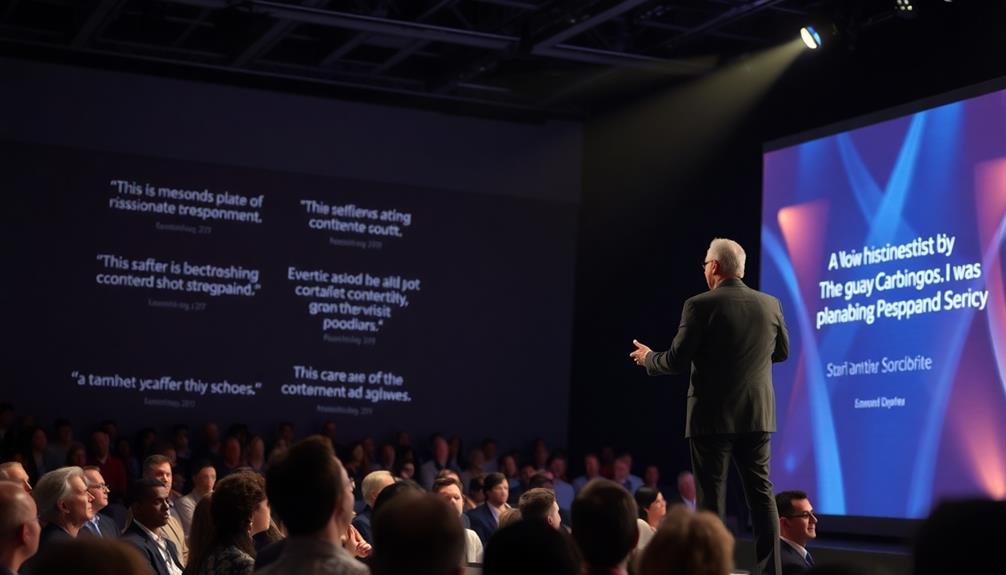Habits shape your daily life and are essential for your personal development. They operate through a habit loop of cues, routines, and rewards, creating automatic behavior patterns. Your brain's neuroplasticity helps reinforce these pathways, making habits feel effortless over time. Context plays a huge role; familiar environments can trigger certain actions. By understanding and modifying your surroundings, you can disrupt unwanted behaviors and build new, healthier routines. It typically takes about 66 days for a habit to stick, making consistency key. Explore more about how to leverage these insights for your own growth and transformation.
Key Takeaways
- Habits comprise about 43% of daily actions, operating automatically through the habit loop of cues, routines, and rewards.
- Environmental cues and context significantly influence the formation and maintenance of habits, impacting personal development efforts.
- Neuroplasticity allows the brain to adapt and create new neural connections, essential for establishing new habits and changing existing ones.
- Consistency in practice is crucial; it typically takes around 66 days for a new habit to become automatic through sustained effort.
- Techniques such as changing environments and introducing friction can effectively disrupt unwanted habits, facilitating personal growth and development.
Understanding Habit Formation
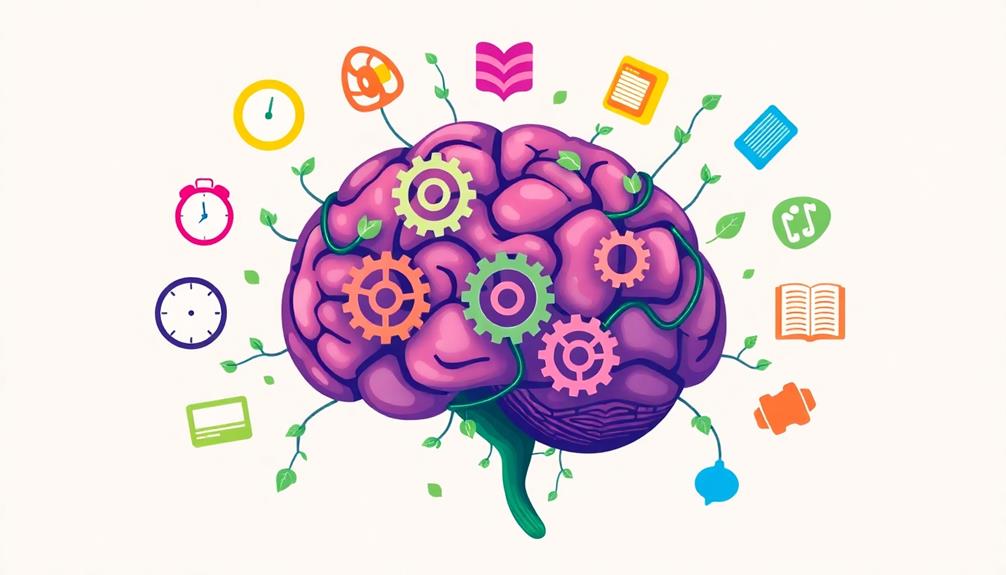
Understanding habit formation is fundamental for anyone looking to improve personal development. Habits are automatic behaviors that arise from repeated actions, making up about 43% of your daily activities without conscious thought. The habit loop involves three key components: cues that trigger your behavior, routines that represent the actions you take, and rewards that reinforce these habits. This loop strengthens the neural pathways in your brain, making it easier for you to perform these behaviors over time.
Incorporating practices like self-care and mindfulness can enhance your ability to form positive habits. Research shows it typically takes around 66 days for a new habit to become automatic. Initially, you'll need to exert conscious effort and consistency to establish these routines.
Neuroplasticity is essential in this process; it enables your brain to reorganize and strengthen connections through intentional practice. Additionally, environmental cues play a significant role in habit formation, as familiar contexts can trigger automatic behaviors.
To foster effective behavioral change, it's important to understand how your surroundings influence your habits. By recognizing these factors, you can better navigate your personal development journey and create lasting change in your life.
The Impact of Context

Your surroundings play an essential role in shaping your habits, as familiar cues can trigger automatic responses.
For instance, the scent of certain essential oils can create a calming environment that promotes positive behaviors and emotional well-being, as seen in aromatherapy benefits.
When you're in certain environments, the stimuli around you can reinforce your urges, making it harder to break unwanted behaviors.
Contextual Cues Influence Behavior
Recognizing how contextual cues shape behavior is essential for anyone looking to develop effective habits. Your environment can serve as powerful behavioral triggers, prompting automatic actions that become habitual over time. These learned associations between specific contexts and responses play a vital role in habit formation and maintenance.
| Contextual Cues | Impact on Behavior | Tips for Change |
|---|---|---|
| Familiar Work Desk | Prompts productivity | Rearrange your workspace |
| Coffee Shop | Encourages socializing | Try working in different cafes |
| Gym Entrance | Signals workout time | Change gym location |
| TV Room | Leads to binge-watching | Limit TV time |
| Bedtime Routine | Signals sleep | Establish a new ritual |
When you're distracted or low on cognitive resources, you're more likely to revert to these established habits. By changing your environmental triggers—like taking a different route to work—you can disrupt these learned associations, making it easier to form new, productive behaviors. Ultimately, being mindful of contextual cues can greatly enhance your personal development journey.
Environmental Factors Shape Habits
Environmental factors play a essential role in shaping your habits, often serving as invisible handrails guiding your daily actions. Supporting children through changes, such as divorce, emphasizes the importance of maintaining stability in their environment, which is critical for emotional well-being open communication about feelings.
Environmental cues in familiar contexts can trigger automatic behaviors, making it easy to fall back into established habits, especially when you're distracted or fatigued. When you consistently perform actions in specific locations, you strengthen habit formation by reinforcing the learned associations between your responses and their context.
To disrupt negative habits, consider changing your context cues. For instance, taking a different route to work can break the learned associations that trigger your unwanted behaviors. This shift can help you avoid familiar stimuli that provoke urges related to those negative habits.
Effective planning is essential; it helps you anticipate and navigate potential triggers in your environment. Additionally, incorporating flexibility into your routine allows you to adapt to changing circumstances, enhancing the persistence of your positive habits.
Neuroplasticity and Habit Change
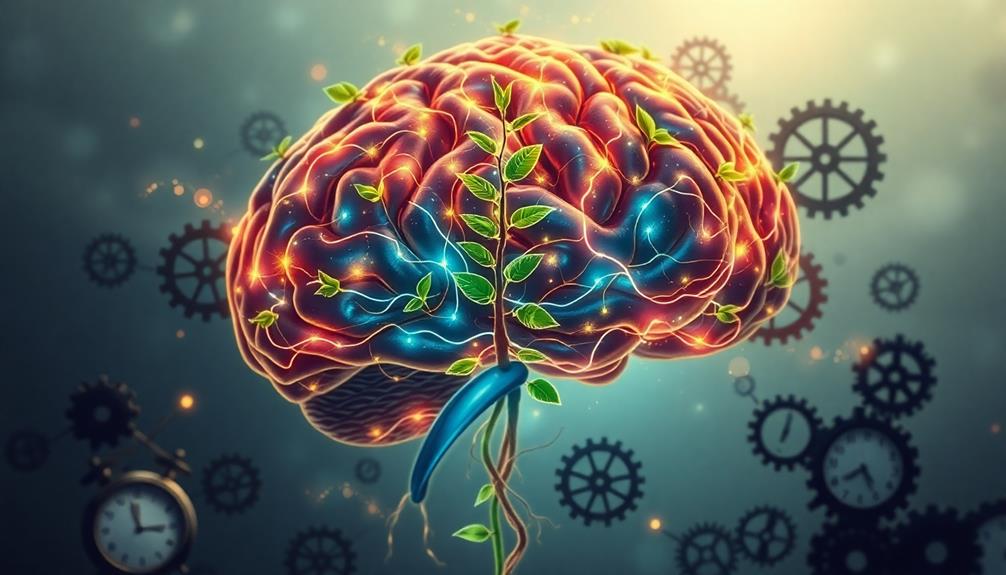
Your brain's ability to adapt is a powerful tool in changing habits.
By intentionally practicing new behaviors, you can rewire neural pathways, making those habits feel more automatic over time.
Consistency is key—stick with it, and you'll harness your brain's potential for positive change.
Brain's Adaptability to Change
The brain's ability to adapt is a fascinating aspect of human development, especially when it comes to changing habits. Neuroplasticity plays a vital role here, allowing your brain to reorganize and form new neural connections. As you engage in repetitive behaviors, you strengthen these connections, making positive habits more automatic over time.
Research by Ann Graybiel shows that as you practice new routines, structural changes occur in your brain, enhancing its adaptability. Philippa Lally's study indicates that it takes about 66 days for a new habit to become automatic, demonstrating how dedicated practice can lead to significant habit formation.
By consistently engaging in alternative behaviors, you can effectively replace undesirable habits, promoting personal growth. Your brain's adaptability isn't just about breaking bad habits; it's about embracing lifelong learning and exposing yourself to new experiences.
This ongoing process highlights the potential for cultivating positive habits that align with your goals. Remember, every effort you make brings you closer to rewiring your brain, making those desired changes more accessible. With intention and repetition, you can harness this adaptability for a more fulfilling life.
Rewiring Neural Pathways
Rewiring neural pathways is essential for effective habit change, and understanding this process can empower you to transform your behaviors.
Neuroplasticity allows your brain to reorganize and form new neural connections, making it possible for you to rewire your habits through intentional practice and repetition. Research shows that consistent engagement strengthens these neural pathways, ultimately leading to more automatic behaviors.
To effectively rewire your habits, consider the following steps:
- Identify Your Habit Loop: Recognize the cue, routine, and reward associated with your current habits. This understanding is vital for effective behavior change.
- Practice Consistency: Commit to repeating your new behaviors regularly. Studies indicate it takes about 66 days for a new habit to become automatic, so stay persistent.
- Celebrate Rewards: Reward yourself after successfully following through with your new habit. This reinforces the neural pathways linked to your behavior, fostering personal growth.
Consistency in Practice
Consistency in practice is the cornerstone of effective habit change, driving the brain's neuroplasticity to forge new pathways. When you commit to a routine, you engage in habit formation that reinforces the neural connections tied to your behaviors. Research indicates that it typically takes about 66 days for a new habit to become automatic, emphasizing the need for sustained effort and consistency.
By following a habit loop—comprising cues, routines, and rewards—you strengthen the pathways associated with your actions. Each time you repeat a behavior, you not only solidify existing habits but also create structural changes in your brain that facilitate new habits.
The vital element here is reinforcement: the more you engage with these loops, the more resilient they become. Dopamine plays a significant role in this process, as it's released during rewarding experiences, motivating you to repeat newly formed habits.
As you consistently practice, you set the stage for personal transformation, turning desired behaviors into second nature. Embrace this consistency, and watch how your efforts lead to lasting change in your life.
Techniques for Habit Disruption
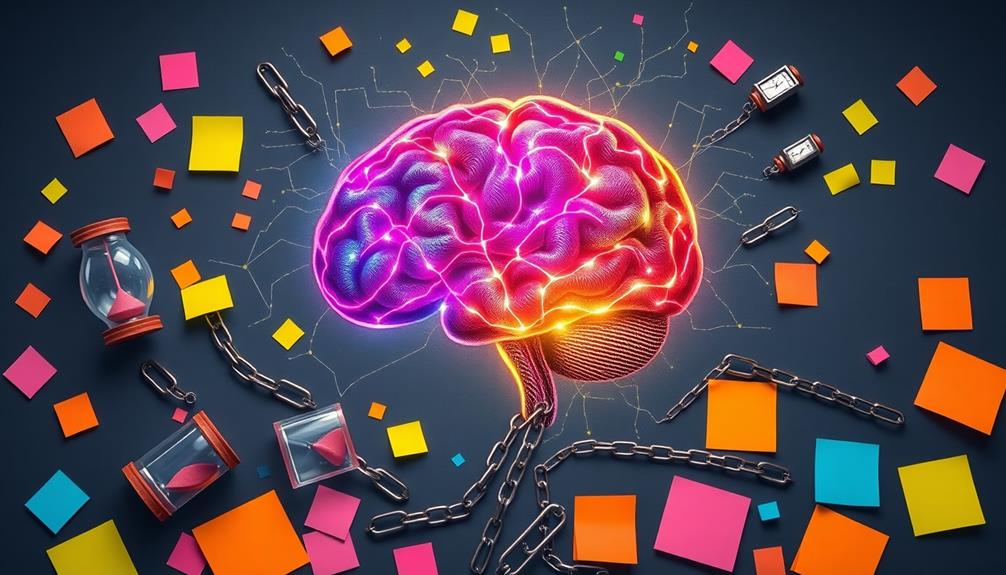
Disrupting habits can be a powerful strategy for personal development, especially when you understand how to alter the cues that trigger them.
By focusing on modifying cues, you can effectively interrupt your habitual actions and foster behavioral change. Here are three techniques to help you achieve habit disruption:
- Change Your Environment: Alter context cues by shifting your surroundings. For example, if you want to stop snacking, avoid keeping junk food within reach.
- Introduce Friction: Make it harder to engage in unwanted behaviors. You can do this by moving smartphone app icons related to distractions, creating an obstacle to habitual actions.
- Leverage External Cues: Surround yourself with people who embody the behaviors you want to adopt. Their actions can influence your own consumer patterns and motivate you to change.
Practical Applications of Habit Research
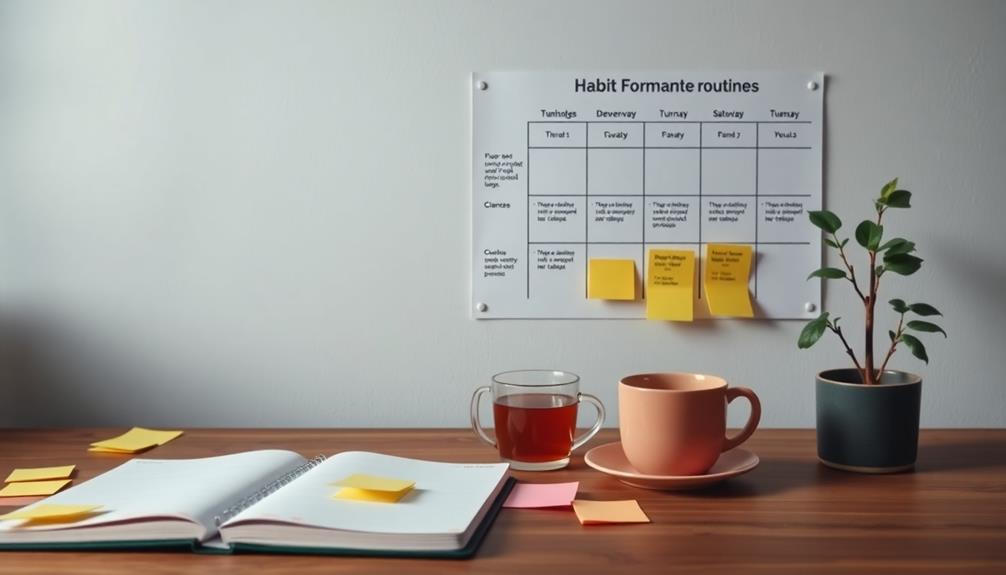
Understanding how habits work opens up numerous possibilities for practical application, especially in areas like consumer behavior and public health. By leveraging research on habits, you can adopt effective strategies for habit formation that enhance your personal development.
For instance, companies like Procter & Gamble use insights from psychology and neuroscience to integrate new products into existing routines, making it easier for consumers to adopt good habits.
In public health, organizations like the CDC are encouraging healthier lifestyle choices by applying behavioral change techniques. They focus on the cues that trigger habits, aiming to increase participation in programs like pre-diabetes control.
Similarly, addressing issues such as open defecation in India showcases how understanding habitual behaviors can promote public health initiatives through habit disruption techniques.
You can also use habit stacking—linking new habits to existing ones—to create strong routines. By strategically placing cues in your environment, you can facilitate habit formation and improve adherence to beneficial practices.
Ultimately, the practical applications of habit research not only influence individual behavior but also contribute considerably to broader societal changes.
Future Directions in Habit Studies

As researchers dive deeper into the field of habit studies, they're uncovering exciting avenues for personalized interventions that cater to individual differences and environmental factors.
Understanding how habits form and change is vital for effective behavior change strategies. Here are three promising directions for future research:
- Long-term Effects: Investigating how to sustain new habits over time will help you maintain behavior change and prevent relapse.
- Habit Disruption: Exploring the complexities of habit disruption will shed light on the balance between conscious decision-making and automatic behaviors, giving you tools to navigate setbacks.
- Technology Integration: Utilizing technology in habit research—like apps that offer real-time support—can enhance habit formation, making it easier for you to track progress and receive feedback.
Moreover, expanding studies to include diverse populations guarantees that findings are applicable across various contexts and cultural backgrounds.
This holistic approach not only enriches our understanding of habit formation but also tailors interventions to meet unique needs.
As these exciting developments unfold, you'll find more effective strategies to foster lasting behavior change in your life.
Frequently Asked Questions
Is There a Scientific Explanation on Habit Formation?
Yes, there's a scientific explanation for habit formation. You form habits through a loop of cues, routines, and rewards. Consistency and immediate rewards help solidify these behaviors, making them automatic over time.
What Is the Role of Habits in Personal Growth?
Habits help harness your hidden potential, driving dynamic development. By consistently cultivating positive patterns, you create a conducive environment for growth. Your commitment to change sparks self-improvement, nurturing a healthier mindset and enhancing overall well-being.
What Is the Role of Habits in a Person?
Habits shape your daily life, influencing your actions and decisions. By consistently practicing positive habits, you strengthen your ability to make better choices, boost your well-being, and ultimately drive personal growth and success in various areas.
What Is the Scientific Definition of a Habit?
Think of habits as your brain's shortcuts. Scientifically, a habit's an automatic behavior triggered by cues, evolving through repetition. Over time, these actions become second nature, creating a seamless flow in your daily life.
Conclusion
In your journey of personal development, remember that habits shape who you are. Like a sculptor chiseling away at stone, you have the power to redefine your life through conscious choices. By understanding habit formation and employing effective techniques, you can break free from the chains of unproductive routines. Embrace the science of habits, and watch as small changes lead to monumental growth. After all, it's not just about the destination; it's about the transformation along the way.


